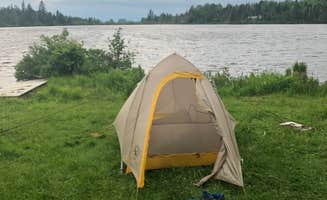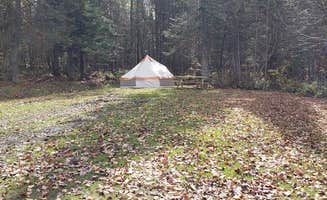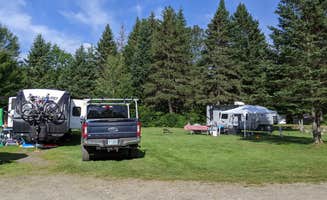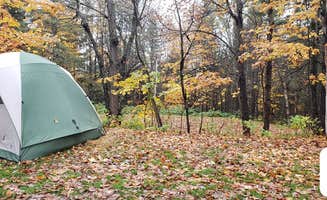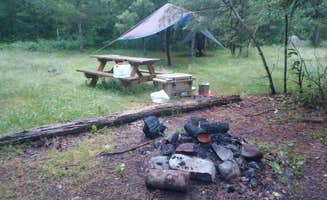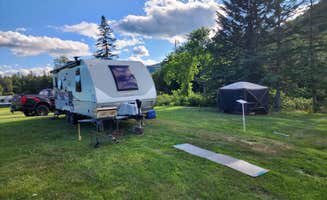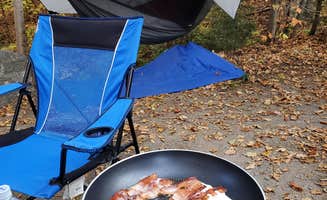Camping sites near Clarksville, New Hampshire span across the northeastern tip of the state where elevations range from 1,300 to 3,300 feet. The region experiences summer temperatures averaging 70-80°F during the day and dropping to 50-60°F at night, with potential frost even in June and August. Northern New Hampshire campgrounds typically maintain quieter hours from 10 p.m. to 7 a.m., and many prohibit firewood from outside sources due to pest control regulations.
What to do
Fishing spots: Lake Francis has excellent trout and salmon fishing opportunities, as noted by a visitor who mentioned, "I was able to get in a morning fly fishing session 5 feet from my tent! The wind was a bit high so no luck for me, but I saw the fish jumping when I stopped by after my hike to pick up some gear I left."
Canoeing and kayaking: Little Diamond Pond offers both rentals and calm waters. "The pond is wonderful, the sounds of loons - Magical," reported one camper who stayed at Coleman State Park. The area has numerous waterways for paddling, including the Connecticut Lakes chain.
Hiking access: Northern Forest trails are accessible from multiple campgrounds. A Cohos Trail thru-hiker noted, "Amazing fishing was also a short hike away up the Connecticut River up to the River Road covered bridge." Many campgrounds serve as access points to longer trails, including sections that cross into Canada.
Wildlife observation: Loon watching occurs at multiple ponds throughout the region. One camper at Deer Mountain Campground shared, "These sites lack amenities, however, the primitive feel really helps you enjoy the beauties of New Hampshire, some of these sites require you to walk about half a mile into them which really adds to the privacy."
What campers like
Waterfront access: Several campgrounds offer direct shoreline camping. A camper at Deer Mountain Campground recommended, "If you want a perfect campsite book #28. You need to carry in/out in the 1/2 mile walk to the site. But you have a secluded open site sitting on the 2nd CT Lake. Listen to the Loons call as you hopefully see a Moose in what is known as Moose Alley."
Clean facilities: Bath houses at Brighton State Park Campground received consistent praise. One visitor noted, "Cleanest showers I've seen at any campsite so far." Another mentioned, "Facilities in the main office were clean. Amazing fishing was also a short hike away."
Private campsites: Secluded options exist at several campgrounds. A reviewer at Coleman State Park shared, "The mix of site types is one of a kind for the area, Lodges, Cabins, Lean-to and tent sites. There is one main facility building with laundry and bathrooms and then a remote outhouse as well."
Stargazing opportunities: Minimal light pollution creates exceptional night viewing. "What you make up for in sparsely wooded sites, is an expansive star-studded sky. Combined with the music of the nearby rapids and the backdrop of Errol's alluring wilderness, you'll be lulled into a deep relaxation," reported a camper at Mollidgewock State Park.
What you should know
Limited cell service: Coverage varies significantly between carriers and locations. A camper at Lake Francis State Park Campground noted, "There IS cell service, at least with Verizon," contradicting previous reports of no service.
Reservation policies: Many campgrounds require advance booking during peak season. One visitor mentioned, "We stopped in on a Saturday at noon to see if by chance there was a site available for one night. There was a cancellation and we had a beautiful secluded, sunny, grassy site."
Seasonal operations: Most campgrounds in the region close by mid-November. The typical camping season runs from mid-May to early October, with Coleman State Park operating "Memorial Day to Columbus Day weekend" and Deer Mountain Campground running "May 19 to November 11."
Weather variability: Temperature swings of 30°F within 24 hours are common. A reviewer at Lake Francis stated, "The lake was incredibly low so it was a good thing we weren't trying to launch a boat," indicating how seasonal conditions affect water recreation.
Tips for camping with families
Activity planning: Look for campgrounds with diverse recreation options. A parent at Mollidgewock State Park Campground shared, "They rent kayaks/canoes on the property which was fun (saw a bald eagle). Awesome hikes nearby - we did Dunn Falls in Maine."
Site selection strategies: For younger children, choose sites closer to bathrooms. As one family noted about Lake Francis, "Super friendly staff. We go the same week each year with a hoard of kids and they remember us each year. My daughter had gotten more candy out of them then she know what to do with answering the daily trivia question right."
Educational opportunities: Several parks offer junior ranger programs and nature activities. A camper mentioned, "The woman at the desk/shop gave us two names to call for kayak rentals, I called North Country Paddle (603-538-6565) and they were very helpful and we had two kayaks delivered within 40 minutes."
Weather preparedness: Pack for both warm days and cold nights, even in summer. "Some sites have new shelters, which are nice when you camp and it's calling for rain. Easily pitch a couple four person tents or a tent and table area, off the groups and well protected in the protected deck shelter," advised a repeat visitor to Lake Francis.
Tips from RVers
Hookup availability: Full-service sites are limited but available at select campgrounds. At Aziscoos Valley Camping Area, an RVer noted, "The campground does have drinking water and a dump station on site as well as sites with power hookups."
Site sizing realities: Actual space often differs from online descriptions. "Note that many of the sites will fit much larger vehicles than what is stated on Reserve America, especially if you have a trailer and can unhook," shared a visitor to Coleman State Park.
Road access considerations: Some GPS directions lead to unsuitable routes for larger vehicles. A camper warned, "Be careful when following certain gps/google directions…depending where you are coming from, you may end up on dirt roads/ATV trails (common in this region of NH) that could be hazardous in a passenger vehicle during poor conditions."
Leveling challenges: Prepare for uneven terrain at many sites. One RVer at Aziscoos Valley reported, "Our site was in an open grassy area that was visible from the road with great views of the river. Though the site was open, the camp sites are spaced far enough apart that we still felt that we were camping privately."


